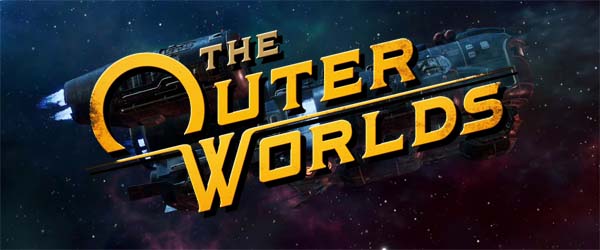
Obsidian Entertainment's follow-up to Fallout: New Vegas was a hotly-anticipated game for me, but it's timed exclusivity on the Epic Game Store meant that I had to wait an extra year to play it. I probably could have gotten it on console. I didn't because I was worried about performance limitations, but I don't recall reading or hearing too many complaints, so maybe it was fine on consoles. Ah well, much like Outer Wilds, I may have ended up waiting unnecessarily long to play The Outer Worlds. Unlike Outer Wilds, The Outer Worlds is not the instant-classic that I had hoped it would be.
Here I come to save the worlds!
The early hours of Outer Worlds seemed promising enough. The game is based largely around the same factional conflicts that drive the plot of Fallout: New Vegas, with the player dropping into an unfamiliar situation, and solving the locals' problems in one of several ways. Most quests will require the player to chose sides in a conflict and fight the opposing side, unless you have high enough speech skills to negotiate some kind of peaceful solution.
This sort of stuff is, of course, the highlight of the game. The relationships between quest-giving characters and their respective factions are like little puzzles for the player to figure out -- puzzles that can be solved equally effectively with kind words, as they can be with a gun, or sometimes both a kind word and a gun. Outer Worlds rewards the player for doing that little extra bit of due diligence to complete an optional objective, or to hack that terminal to find some juicy bit of intel that I can use to sway an NPC to give you what you want.
Players also assemble a crew of companion characters, each with a strongly-defined role. Each companion provides buffs to certain player skills. Parvati provides a buff to engineering skills, Ellie provides a buff to medical skills, Max provides buffs to hacking, and other characters provide various combat skill and intimidation buffs. These buffs can stack together and get quite large too, especially after you take one or two perks to improve them. I hardly ever needed to use food or drugs to buff a skill because my companion characters almost always provided me with enough of a boost to get me through most quests.
Players create a crew of companion characters to go questing with you.
I was actually surprised at how early in the game I had recruited all possible crew member. All but one come off of the first world, and the final one can be acquired on an early game quest on another world.
Which companions I take on a particular quest is, therefore, important. I found it was a good idea to pay attention to the dialogue from quest-givers to get a better idea of what lies ahead for me in a given quest. It's also worthwhile to check out the quest log to get any insight on what I'm expected to do. Going on a "bug hunt"? I'll take my heavy-hitters like Nyoka or Felix. Need to hack my way into a derelict outpost and get it operational again? Take Parvati and Max. Need to rescue some colonists who are trapped in a cave? Take Ellie and Nyoka in case anyone needs medical attention.
Or at least, that's how it works in principle. Remember when I said that the game seems promising in the beginning? Well that's because the opening chapter of the game is a very well-constructed vertical slice of everything that Outer Worlds has to offer. The downside is that, unlike Fallout: New Vegas (which has a similarly excellent opening chapter that serves as a vertical slice preview of the whole game), the whole rest of The Outer Worlds is just the opening quests repeated several more times on different planets, and it never gets much harder or more surprising.
In practice, there weren't very many quests that required diverse skills. I only specifically remember having to treat an NPC's wounds twice, and one of those was at the very start of the game before I had Ellie in my party anyway. Even though I kept taking Parvati whenever I thought I was going to need to repair things, there were still only a handful of engineering checks, and I recall them all being relatively easy. Honestly, I found that quests seemed to be much more dominated by speech checks, and my companions were mostly just bullet sponges and pack mules. [More]

In the previous essay in this series about how Madden fails to simulate football, I discussed how QBs in real football go through their progressions to find open receivers to throw to. And then the second half pulled a bit of a bait-and-switch and turned into a pitch for the return of the QB Vision mechanic, or something analogous. Surprise!
I also briefly talked about how the goal of the defense is to cover the primary receiving threats long enough for the pass rush to disrupt the play. In the best of cases, the defense can cover the receivers long enough to sack the quarterback, or force him to make a bad throw into coverage that is intercepted. But sacks and interceptions aren't really the goal of the defense. The defense will, of course, be happy to take them when they happen, but no defensive play is really designed to force a sack or an interception.
The full video on YouTube contains additional commentary and examples.
Truth is that a lot of relatively mundane outcomes can be complete successes for the defense. Forcing the QB to throw before he can make his reads and set his feet so that he throws an inaccurate ball is a success. That is true whether the QB deliberately throws the ball into the sixth row of the stands, or if his rush to release the ball puts it inches out of reach of the receiver's outstretched fingertips, or if his inability to set his feet results in a weak, wobbly ball that bounces harmlessly at the receiver's feet. Or maybe the defense tips the pass or knocks it down such that the play gains no yards. All of those outcomes represent unqualified defensive success.
Defenses don't need sacks or turnovers to "win" a series.
If a defense can do this for three consecutive plays and force the offense to punt, then the defense did it's job, even if it isn't flashy, doesn't show up in a Chris Berman highlight reel, and doesn't light up a stat board. Heck, even forcing a check down that is completed for positive yards, but which does not result in a first down is still a success for the defense! Especially if it happens on 3rd or 4th down.
Of course, the defender who wants to pad his stats with a sack or interception, and get a big payday next time contract negotiations come along, might disagree.
EA's Madden video games apparently disagree as well. Since the pace of play in Madden is sped up to facilitate the shortened length of quarters, gaining yards and making first downs is really easy for the offense, but yet sacks are paradoxically too common.
Get used to hearing statements like that. Quarter length and game pacing was the first essay of the series for a reason! -- because it really is so fundamental to almost everything that is wrong with Madden. I would not be surprised if every single essay of this series will refer back to that first episode at least once or twice!
For much of Madden's history, pass rushers either have no impact on the play (because the QB can see the entire field and can hit any receiver on the field with the press of a button), or the pass rush downs the quarterback for a seven yard loss on a sack. Sometimes two or three times in a row if the game's scripting or an X-Factor ability decides that the defense should win this particular possession.
Playing Madden on 15-minute quarters, it's not uncommon to see each team pile up 5, 6, or 7 sacks by the end of the game. For reference, good NFL defenses usually average 2 or 3 sacks per game. You can adjust the difficulty level or the "Pass Blocking" A.I. sliders to reduce the frequency of sacks, but then this leads to the opposite problem of the pass rush being almost completely irrelevant, and QBs having the opportunity to complete more deep shots that inflates completion percentages, passing yards, and final scores.
On 15-minute quarters, it is not uncommon to see each defense record 5 or more sacks. [More]
a6a80c39-8342-4d3a-b342-7e65d2672e8a|0|.0
Tags:Madden, Madden NFL, How Madden Fails to Simulate Football, EA, EA Sports, Electronic Arts, Tiburon, football, simulation, sports, YouTube, pass rush, blitz
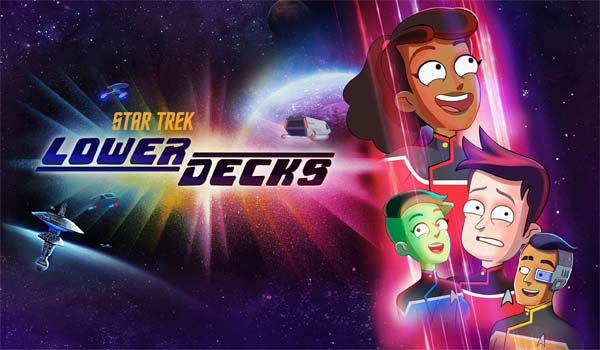
It took me a while to get around to watching this one. After having been immensely disappointed and frustrated with both Star Trek: Discovery and Picard, I was not going to give CBS a single penny of my money. I still haven't watched the second season of Discovery (let alone the third), despite having heard that the second season is an improvement. In fact, I've been so bitter at CBS that I didn't even bother activating my account to stream the second season of Twilight Zone, even though the first season was good enough that I was curious to see the second season. I also didn't bother reactivating my CBS account to stream Star Trek: Lower Decks, even though my partner really wanted to watch it.
I was willing to cut a little more slack for Lower Decks, on the grounds that "surely an animated comedy will not be considered 'canon', so I don't have to take Lower Decks as seriously." But then I started seeing events, characters, and ships from Lower Decks showing up in articles on the Memory Alpha Star Trek wiki, and the thought of having to take Lower Decks seriously as canon tanked my interest in watching the show. I wouldn't be able to sit back and enjoy Lower Decks in the manner that I enjoy something like The Orville; I would have to watch it with my critic glasses on, and the baggage of expectations that comes with carrying the Star Trek torch.
I told my partner I didn't want to pay for CBS, so we would wait until all the episodes had aired, do the free trial with a new email address, and binge them all in like a weekend or something. And maybe I'd check out season 2 of Twilight Zone while I was at it. But we didn't keep track of the progress of the show, it fell onto the back-burner, and we just didn't get around to it.
Then, a few weeks ago, a friend offered to let me borrow his downloads of the show, as well as offering pretty high praise. My partner and I still wanted to give Lower Decks a chance, so I accepted, and we watched it.
... And it's ... fine. It's fine. It's OK.
The Best "Trek" that CBS has to offer?
Lower Decks is entertaining enough. It provides a decent laugh here and there. And it's actually telling some high-concept sci-fi stories -- albeit wrapped in a layer of absurdist comedy. As a stand-alone show, without the baggage of the "Star Trek" title, it's perfectly serviceable. It's not quite up to the level of The Orville -- at least not once The Orville had set aside the Family Guy antics and started focusing more on its characters and stories.
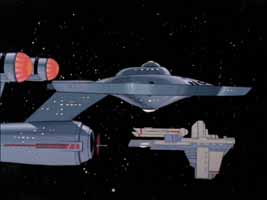 - ST: Animated Series "More Tribbles, More Troubles", episode 5
- ST: Animated Series "More Tribbles, More Troubles", episode 5
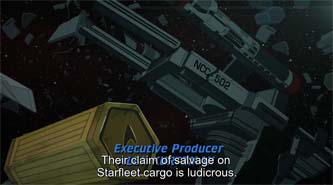 - ST: Lower Decks "Terminal Provocations", season 1, episode 6
- ST: Lower Decks "Terminal Provocations", season 1, episode 6
Lower Decks remains faithful to the aesthetic of Star Trek, while still establishing its own visual identity.
And you know what, as an official installment of Star Trek, Lower Decks ain't bad either. Lower Decks is certainly the best Star Trek show that CBS has created for its streaming service so far, and definitely [ironically] the most worthy of "canon" status. [More]
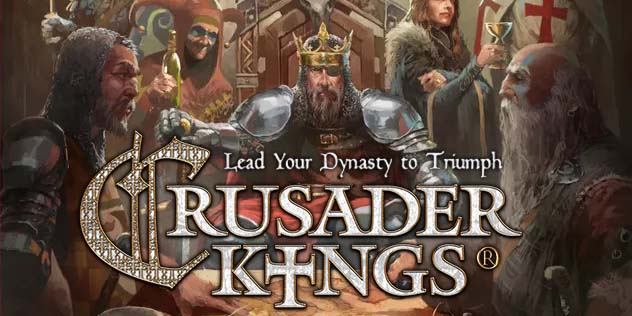
I wasn't very surprised to see a game like Sid Meier's Civilization adapted to a board game. Civ (the computer game) was always heavily inspired by board games to begin it, and so it's mechanics translated easily back into board game formats without losing much other than the broader scope of the PC game.
Paradox's Crusader Kings, on the other hand, is a totally different beast of a PC game. It is an insanely complicated, system-based blend of grand strategy game, RPG, and social sim. It simulates thousands of individual characters across hundreds of countries and duchies through dozens of generations. The possibility space is vast. As such, I would never have expected to see anyone attempt to try to boil down this deep historical simulation into a tabletop board game. Well, I guess I shouldn't say "never". In this age of every media property being adapted to board game formats, I suppose it was inevitable for someone to try.
And someone did try. In 2019, a year before the release of the Crusader Kings III PC game, Swedish board game manufacturer Fria Ligen ("Free League Publishing") released a board game version licensed by Paradox. I received the game as a gift last fall (during the height of social distancing during the COVID-19 pandemic), and so didn't get to start playing the game until well into 2021, when we finally felt a little more comfortable meeting up with friends.
As much a story-generator as a board game
For any PC players coming to the board game, there is something very important that you should know about Crusader Kings: the Board Game: it's focus is largely on the story-telling aspect of the Crusader Kings experience. If you play the Crusader Kings PC game as a hardcore strategy game, then you will probably find the board game lacking in that respect. The Crusader Kings board game is as much a story generator as it is a strategy game -- perhaps moreso.
As a story generator, my friends and I have found Crusader Kings to be very entertaining. It's certainly one of the better story-telling games that I've ever played.
Each action card will include a random event that is either disruptive to the current player,
or which benefits another player.
The way that Crusader Kings creates its little stories is through the random events of each player's action cards, and through the resolution of events by drawing trait tokens. Each turn, a player plays a pre-selected card from their hand. You perform your chosen action, and then you resolve a random event on the card. All cards, except for the "Crusade" action cards, will have a random event that is either harmful to the active player, or which provides a benefit to another player (usually the next player in the turn order).
Many actions and card events will also require that the player draw traits from a bag (similar to a die roll in most other games). Each player character starts with a pre-determined set of traits at the start of the game, and can acquire new traits through marriages, succession, or other events. All your traits go into a bag, and you draw one or more blindly from the bag to resolve a given trait check and determine the outcome of an event.
Player actions, card events, and trait draws, thus combine together to create emergent stories in both the short and long term. Sometimes these little stories can play out over the course of a few actions or turns. Other times, game-long narratives can form. [More]
34573e81-f1df-4d97-b5bc-74233cbd3e71|0|.0
Tags:Crusader Kings, Paradox Interactive, Free League Publishing, emergent narrative, grand strategy, history, medieval, Europe, crusades, war, casus beli, dynasty, succession

I think I'm becoming a fan of Blue Orange's line of family-friendly games. I bought Photosynthesis for my daughter several years back, and it has proven to be a hit with many of my adult friends for its fun and simple gameplay, and its lovely aesthetics! We've since bought a couple more of Blue Orange's games in the hopes of finding similarly fun and educational games that players young and old can enjoy. One such game is Planet, which is much simpler and quicker to play than Photosynthesis, but doesn't quite live up to Photosynthesis' production quality and educational value.
The core premise of Planet is that each player receives a magnetic dodecahedron that represents their barren "planet core". Each round, players select one of five possible "continents" to place on one of the surfaces of their "planet". Each continent tile is divided up into 5 parts, each with a terrain, and every continent tile has at least 2 different types of terrain on the tile.
Starting with the third round, randomly-drawn animal cards will be given to the player who has the planet that best meets each card's animal's respective habitat requirements, and each animal is worth points at the end of the game. In addition, each player is given a secret objective card that provides them bonus points at the end for covering as much of their planet as possible with a specific type of terrain.
Terrain types include green forests and jungles, brown mountains, yellow deserts, white ice, and blue ocean. Each animal has a preference for one specific type of terrain, as well as a secondary preference for adjacent terrain. By arranging your continent tiles on your planet in specific and varied configurations, your planet can hopefully attract the most animals.
Each player starts with a blank dodecahedron "planet", and builds a life-sustaining world continent by continent.
Abstract edutainment
Planet is an "edutainment" product that seems intended to teach children a little bit about animal habitats, how the relationships between different ecosystems drive animal evolution, and how biodiversity creates a healthier planet. Unfortunately, the game might be a bit too abstract in its educational endeavors, especially for a game intended for children under 12 years old.
There are a handful of animals that I don't recognize.
It would be nice if the game taught me about them.
The biggest failing (and missed opportunity) in the game, in my opinion, is that the animal cards lack any information about the animals themselves. Each card has a picture of the animal, and a graphic representing its preferred terrain types, as well as a colored border representing the animal's natural habitat. That's it. The cards don't even have the name of the animal printed on them. At bare minimum, these cards really should have had the name of each animal (and maybe also its scientific nomenclature as an added bonus for older players). As an adult, I recognize most of the animals by their picture, but there are a handful that I don't recognize. I'm guessing that a lot of young kids also have no clue what many of these animals are.
Had I designed the game, I also would have tried to print one or more little factoid(s) about each animal on their cards. Since the game puts a focus on the habitats of each animal, I think the factoids should probably emphasize the animal's niche within that particular habitat -- where it lies on the food chain, how it promotes the growth or health of the rest of its ecosystem, that sort of thing. But nope. We get nothing but a picture and the bare essentials of gameplay requirements.
For such a short, simple game, there's not a whole lot going on in terms of strategy, so it's a real missed opportunity that the game doesn't play up its educational elements more strongly.
That being said, the artwork on the cards is all very pretty. The animal images clearly depict the animal and a backdrop of its natural habitat, and a lot of them are really cute. The colors that represent each terrain type are vibrant and distinct, so that there should be no confusion about which terrain is which (barring extenuating circumstances like major color-blindness). [More]
|

| 12 | | | | | | | 60 | | 11 | | | | | | | 55 | | 10 | | | | | | | 50 | | 09 | | | | | | | 45 | | 08 | | | | | | | 40 | | 07 | | | | | | | 35 | | 06 | | | | | | | 30 | | 05 | | | | | | | 25 | | 04 | | | | | | | 20 | | 03 | | | | | | | 15 | | 02 | | | | | | | 10 | | 01 | | | | | | | 05 |
|